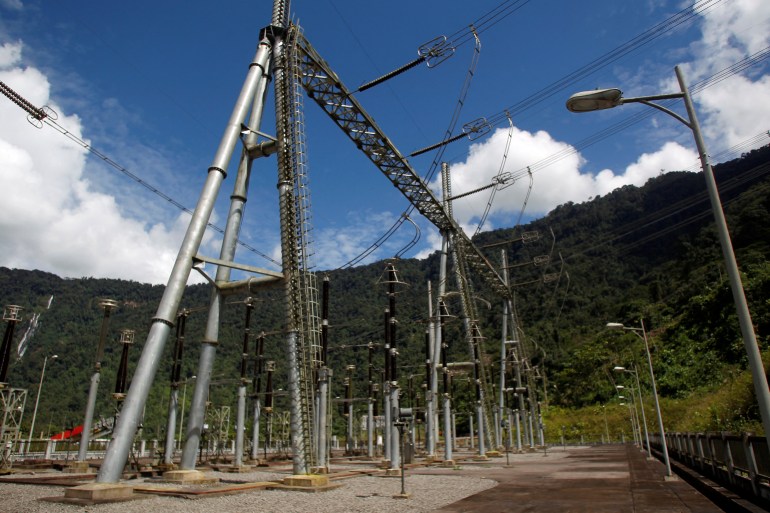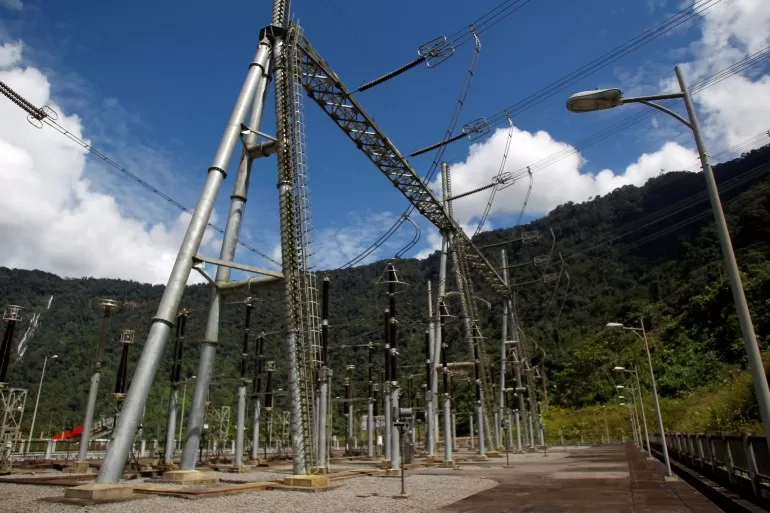Colombia has stopped electricity exports to Ecuador as both countries grapple with diminished hydroelectric reservoirs.
Speaking in Guayaquil on Tuesday, Ecuadorian President Daniel Noboa acknowledged the critical state of the country’s energy sector.
“Today we took a strong decision – once again we had to – which is to declare an emergency in the country’s energy sector,” Noboa said.
Both Colombia and Ecuador are dependent on hydropower plants to meet the energy needs of their populations. But the drought has sent water levels tumbling, including in reservoirs used for electricity.
A minimum flow of water is required to spin the turbines used to power hydroelectric plants.
However, Colombia’s electricity operator XM has estimated that reservoirs in the country currently sit at 29.8 percent of their capacity. The country is rationing water in areas like Bogota, the capital.
Colombia’s mining and energy minister, Andres Camacho, told reporters late on Monday that the country was addressing the drought by slowing electricity exports.
“Since Easter week, we limited energy exports to Ecuador. Right now, we are not exporting any electricity,” Camacho said.

Camacho’s Ecuadorian counterpart, Minister Andrea Arrobo Peña, issued her own statement on Monday addressing the “unprecedented situations” facing the country and the region.
She announced there would be power outages and rationing to help address the energy shortages.
“The length of the drought, the increase in climate temperatures, the lack of maintenance in the entire electrical system’s infrastructure in previous years and the presence of historically low water-flow levels have caused all available management plants to be activated,” her department said in a statement.
“Therefore, we make a civic call to all Ecuadorians to support efforts to reduce energy consumption during this critical week, considering that every drop of water and every unconsumed kilowatt counts as we face this reality together.”
But on Tuesday, President Noboa announced he had asked Minister Arrobo Peña to resign. He also alluded to corruption and sabotage in the energy sector.
“We have initiated an investigation for sabotage in certain areas and power plants,” he wrote on social media.
He pledged to apply “the full weight of the law” to any bad actors discovered during the investigation.
“The problems in Ecuador’s energy sector in recent years are not due to a lack of technical proposals, but to a lack of execution and firmness in combating entrenched corruption,” Noboa said.
Camilo Prieto, a climate change professor at Bogotá’s Javeriana University, told the Associated Press news agency that this year’s drought is not as bad as some in the past.
But, Prieto warned, energy consumption has grown in countries like Ecuador and Colombia, leaving their residents vulnerable to extreme weather patterns brought about by El Niño.
“If demand continues to grow and the energy mix in these countries is not diversified, they will continue to be vulnerable,” Prieto said.
